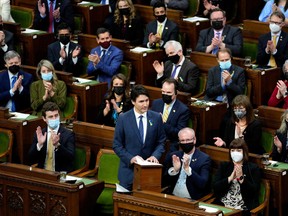
There are a couple of thorny questions plaguing the federal government these days.
The first comes as the Public Sector Alliance of Canada prepares for a strike vote. It seems the good folks at PSAC are unhappy. They want a 13.5% increase over three years and the stingy government is offering 8.5%.
From our newsroom to your inbox at noon, the latest headlines, stories, opinion and photos from the Toronto Sun.
Thanks for signing up!
A welcome email is on its way. If you don't see it, please check your junk folder.
The next issue of Your Midday Sun will soon be in your inbox.
PSAC President Chris Aylward says the offer is “insulting” and that his members “are being asked to take a cut in pay.” Aylward obviously hasn’t had the opportunity to read the recent Fraser Institute report that found public-sector workers way ahead of their private-sector equivalents.
But never mind that. The real problem here is the union’s opposition to the government’s rather meager return-to-work plan. PSAC members like working from home.
So, what will they do if PSAC calls a strike? Picket their own homes? Picket a neighbour’s home?
Or will the PSAC order its members back to work to picket back-to-work plans? These aren’t easy times.
The second conundrum involves the recent dust-up over the government’s contracts with McKinsey & Company consulting. The Trudeau government has paid McKinsey a tickle over $100 million for consulting services. That much cash begs questions including suggestions that the relationship between McKinsey and the government is a little too close.
So, what’s a government to do? Standard operating procedure would be to issue a request for proposals for a consultant to write a report on consulting. Heck, if McKinsey was the low bidder, they could research the finer points of hiring themselves. Problem solved.
I’m no expert on McKinsey. The only thing I know for sure is McKinsey didn’t hire themselves, didn’t prepare the scope of work and obviously isn’t responsible for implementing their recommendations.
The questions raised over the efficacy of expanding the use of consultants while also growing the public service are misguided. These are separate issues.
Consultants are hired to provide short-term expertise or to provide an external (and sometimes global) perspective.
As James Taylor said, “No one can both inside and outside be.”
-

OPINION: Just Transition plan comes with big costs for taxpayers
-

LILLEY: Let’s deal in facts on health reform, not false claims driven by political agendas
-

GREEN: Trudeau's 'net-zero' mission will cause widespread economic and social harm
The real scandal here is an old one – the government isn’t very good at procuring anything. To the long list including PPE, fighter jets and ships we can add consultants.
Way back in 2009, the Ontario government had a dustup over consulting contracts at the ill-fated eHealth. If memory serves, a consultant under contract at the then-eye-popping fee of $2,700 dollars a day found it necessary to expense a tea and muffin for $3.27. Again, if memory serves, the government paid for the muffin.
There are two problems with that saga. First, having been embarrassed by a blueberry muffin, the public service ratcheted down on all things trivial. I suspect the cost of building ever more expensive fences around ever less important expenses has cost the Ontario taxpayer millions over the last decade. That was one expensive muffin.
Secondly, the real scandal was eHealth itself. A decade of false starts and a billion wasted dollars produced nothing (well, nothing other than a fine office and a couple of good scandals).
The problem here is the public service is long on process and short on results. Since failure can’t be tolerated, success is limited to properly following procurement rules, diligently managing contracts, production of spacious reports on a regular schedule and rigid adherence to project scope.
In other words, process is the intended output.
McKinsey isn’t a bad consulting firm. The government is a horrible client.


